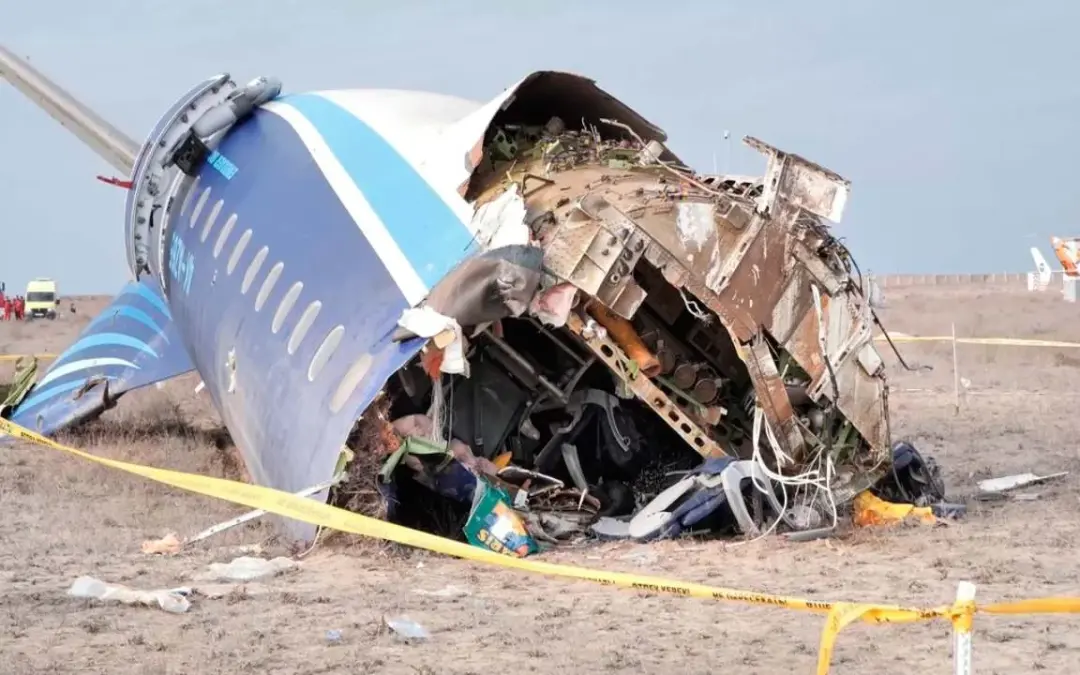Kazakhstan – December 27, 2024
In a tragic turn of events, an Azerbaijan Airlines plane, Flight J2-8243, crashed in Kazakhstan on Wednesday, killing 38 people. Preliminary findings from Azerbaijan’s investigation suggest that the disaster may have been caused by a Russian air defense system, Reuters reported on Thursday, citing four sources familiar with the investigation.
The Embraer passenger jet was en route from Baku, Azerbaijan’s capital, to Grozny, in Russia’s Chechnya region. During the flight, it suddenly diverted hundreds of miles across the Caspian Sea before crashing in a ball of fire near Aktau, Kazakhstan. The aircraft’s distress and subsequent crash occurred in an area where Russia has actively deployed air defense systems due to ongoing tensions with Ukraine.
Preliminary Findings: Russian Air Defense Involved
According to one Azerbaijani source close to the investigation, the crash was likely caused by a strike from a Russian Pantsir-S air defense system, which may have been triggered by the plane’s flight path near Russia’s southern region. The source indicated that the plane’s communications were disrupted by electronic warfare as it approached Grozny.
While acknowledging that there was no evidence to suggest the attack was intentional, the source expressed hope that the Russian government would acknowledge its role in the incident. “No one claims that it was done on purpose. However, taking into account the established facts, Baku expects the Russian side to confess to the shooting down of the Azerbaijani aircraft,” the source stated.
International Reactions and Calls for Transparency
As the investigation continues, international governments have expressed concern. A U.S. official confirmed that there were initial indications that a Russian anti-aircraft system may have struck the plane. The Canadian government also voiced deep concern, urging Russia to allow a transparent investigation into the incident. “We call on Russia to allow for an open and transparent investigation into the incident and to accept its findings,” the Canadian Foreign Ministry said in a statement on social media.
However, Kazakh officials have refrained from drawing conclusions. Deputy Prime Minister Qanat Bozymbaev said he could neither confirm nor deny that Russian air defenses were involved in the incident. Meanwhile, the Kazakh transport prosecutor handling the case stressed that the investigation had not yet reached a definitive conclusion.
The Russian government has also been cautious, with Kremlin spokesperson Dmitry Peskov commenting that it would be inappropriate to speculate before the official investigation’s findings are released. “It is wrong to build hypotheses before the conclusions of the investigation,” Peskov stated.
Flight Details and the Flight Path Mystery
Flight J2-8243 was flying from Baku to Grozny, a relatively short route that typically does not take planes over the Caspian Sea. However, for reasons that have yet to be clarified, the aircraft veered off course and crossed into the waters of the Caspian. The plane’s closest Russian airport, Makhachkala, was closed on the morning of the crash, adding to the mystery of why the plane crossed such a large body of water before its final descent.
Russia’s aviation watchdog initially suggested that the crash could have been triggered by a bird strike, though this theory has not been conclusively proven. The investigation continues, with various countries, including Kazakhstan and Azerbaijan, closely monitoring the situation.
Conclusion: A Delicate Investigation
The tragic crash of Azerbaijan Airlines Flight J2-8243 has sparked a complex and sensitive investigation into the cause of the disaster. As Russia faces increasing international pressure to cooperate fully with the investigation, the hope remains that the final conclusions will provide clarity and justice for the victims of this devastating incident.


